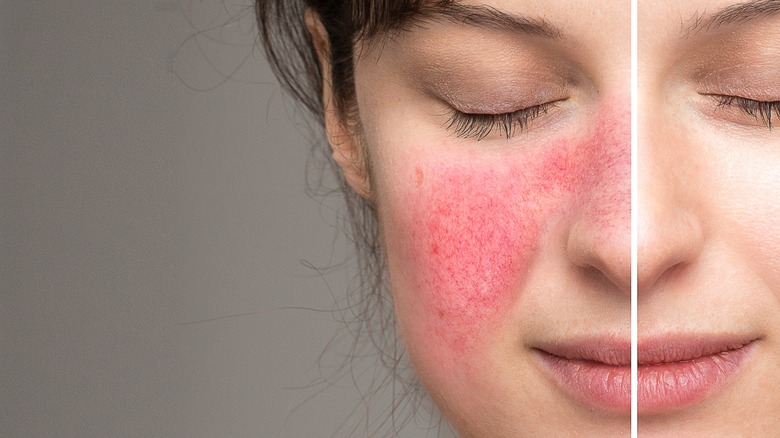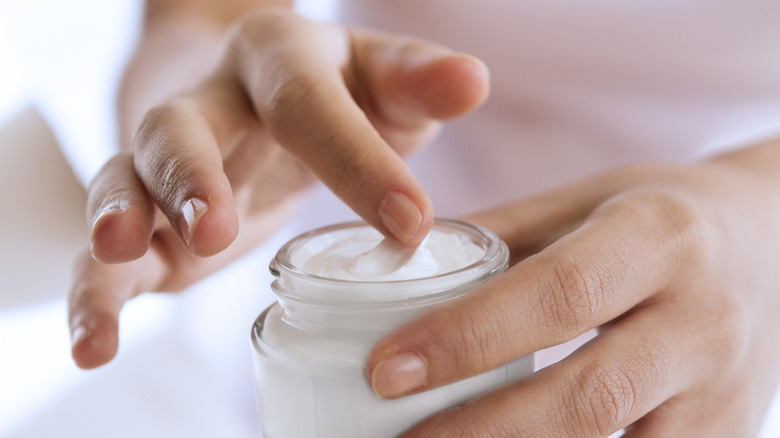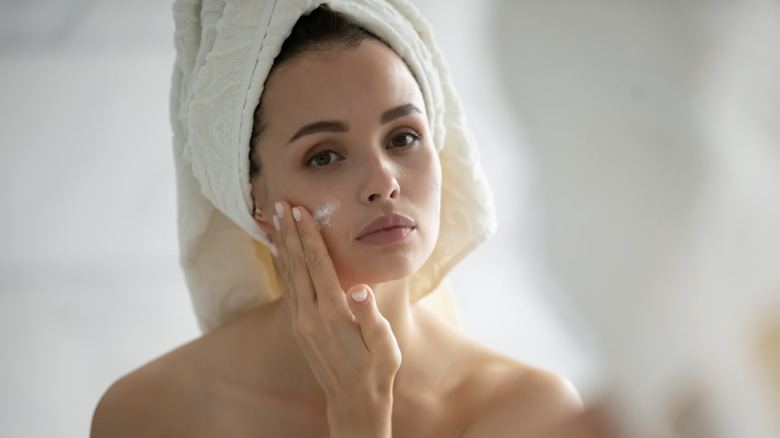Skincare Ingredients To Avoid If You Have Rosacea
You've likely heard the term rosacea before and know it's a skin condition but may not be exactly sure what it is beyond that. It's a common condition that affects 14 million Americans and most typically occurs in those who are fair-skinned and between the ages of 30-50 (via American Academy of Dermatology Association), although it can affect people of all ages, skin types, and skin colors, including children. Women get it more often than men but when men do get it, it tends to be worse.
Rosacea is marked by red, inflamed skin. It can be genetic but is also influenced by bacteria and the immune system. The irritation from rosacea most often occurs on the cheeks and nose.
Some people may not even know they have rosacea since it can get better at times. It often flares up during emotional stress or when exposed to the sun's rays for too long. Since it's an inflammatory condition, you have to be careful with what you allow to come into contact with your skin. Consequently, there are certain skincare ingredients you should do your best to avoid.
These ingredients can inflame skin when you have rosacea
Several skincare products can unknowingly result in a rosacea flare. According to Healthline, there are specific substances found in many skincare products which you should make sure aren't in any skincare products you use. These include many popular ingredients normally thought to be beneficial, such as glycolic, lactic, or salicylic acid, benzoyl peroxide, witch hazel, and alcohol.
Also, some natural substances used to exfoliate skin can also inflame rosacea, like salt and sugar grains and jojoba beads. Any products with fragrances can also disturb sensitive rosacea skin. Menthol, camphor, and urea are other ingredients to avoid.
"Use skincare that is fragrance-free and minimalistic. Complex multi-step routines, acids, exfoliators, menthol, and witch hazel can all be common triggers so are best avoided," Dr. Anjali Mahto told Glamour UK. She added, "Wear a broad-spectrum sunscreen (ideally SPF 50) every day as over 80% of those who suffer with rosacea will find their facial redness is driven by UV light."
Use moisturizer as a barrier
To keep flares to a minimum, it's vital to build a skincare routine to keep skin soft and moisturized "The most important thing is understanding that skin sensitivity and dryness are related to the skin barrier," dermatologist Dr. Emma Craythorne told British Vogue. "Keeping it protected and nourished, and providing a non-inflammatory environment, will help it to keep the good inside the skin, and the bad out."
Next, try to identify what causes flares for you as triggers will be individual and varied. "Whereas some people are triggered by extreme temperatures or cold winds, others find hot beverages are a problem," said Craythorne. "Stress, alcohol, exercise, exposure to UV light and certain medicines can also exacerbate rosacea."
Craythorne suggests keeping a list of anything that induces a flare. Over time, you may be able to identify your biggest triggers and avoid them or at the very least be aware of them so you can prepare for times when you'll be exposed to them.


